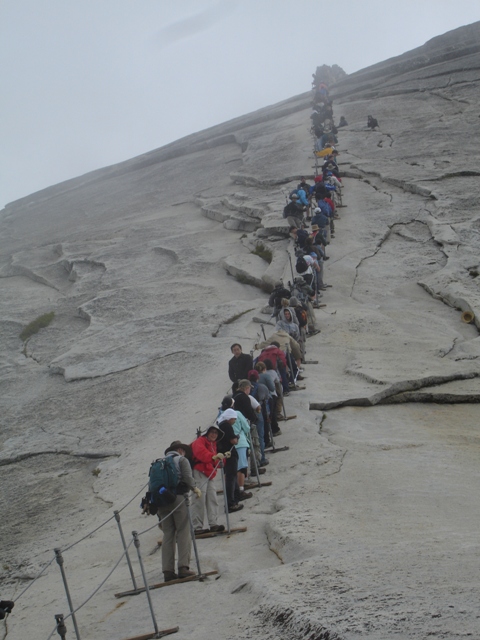Conquering the Peak of Caregiving is like Climbing a Mountain
THE MOUNTAIN CLIMB
Last Spring, my husband, his co-worker, and I climbed a mountain in the Angeles National Forest of Southern California to view a plane-crash site. Starting at 4,900 feet, we climbed to 7,900 feet; first, through pine-needles, then scree (slippery rock and dirt along the side of a mountain). We used trekking poles to keep from sliding down the mountain. Once we reached jagged rocks, we used leather gloves to protect our hands from mutilation.
ALMOST A PILGRIMAGE
Few people take this journey. Because of this, there are no trails, only deer trails—our footprints following hoof prints. It took us ten hours including one-and-a-half-hours of breaks plus a one-hour period at the top; where we took time to memorialize those who had lost their lives decades earlier and to eat, drink, clean our feet, air out socks, change toe pads or band aids. It was a pilgrimage.
During the nearly three-hour journey back and while my knees ached unbearably (I obviously needed a lot more training before tackling Mt. Whitney in September), I got to thinking about caregivers.
CAREGIVERS ARE LIKE MOUNTAIN CLIMBERS …
Like aspiring wilderness trekkers, caregivers rarely know the full extent of the trail ahead. Many of us commit and then take our journey one step at a time. As the journey grows challenging, we often encounter obstacles we believe we can’t surmount. Like mountain trekkers, we need to take a momentary break to catch our breath in order to muster the strength to push forward. Sometimes, we need a little help to maintain our footing on the crumbly terrain. The right tools—whether they are trekking poles, leather gloves, band aids, support group members, family, friends, or other community resources—will prevent us from sliding down the slippery slope of a mountain of caregiving responsibilities.
ON WELL-WORN TRAILS …
Fortunately, caregivers today need not be pioneers during a caregiving journey. Millions have already walked the road of caregiving and hundreds are willing to share their stories. More resources are available to help caregivers—including educational, respite, and in-home care. Instead of having to cautiously navigate along deer trails like caregivers of yesteryear, today’s caregivers are able to follow well-worn and tested paths along the way.
TAKING A PERSONAL JOURNEY …
Yet, the journey is still a very personal one. No amount of resources can eliminate the weight of the emotions and the mental and physical burdens carried in a caregiver’s backpack. All today’s caregivers can do is be prepared with the right educational and assistive tools and be willing to take breaks along the way.
When my thigh began cramping severely at the top of the mountain, I had to take a break to rest and re-evaluate how to use my legs differently or risk a rescue. Nothing is more humiliating (not to mention expensive) than to call for a helicopter rescue. The same holds true for caregiving.
NEEDING REST ALONG THE WAY
Caregivers need rest. You need to know when to stop and reevaluate how you’re going to continue your journey. Too many caregivers have passed on before their loved ones because they exhausted themselves to death. Certainly, no one else can provide as good of care for your loved one as you can. But if you don’t survive the experience, what good has your sacrifice been? Know when to stop, step back, reassess, then call for help before it’s too late.
Updated April 2010 (Originally published 05/26/2009)________________________________________
Almost a year ago when this was originally published, Brenda Avadian was at the College of the Siskiyous, at the foot of Mt. Shasta (northern California) helping the Mountain Caregiver Resource Center (MCRC) with their annual Caregiver Retreat. The attending caregiving heroes were taking a much-deserved weekend respite from their daily caregiving duties to reassess, regroup, and recreate in order to have strength to continue caring for their loved ones. For information about the MCRC’s programs call: 800-995-0878 For information about the California Caregiver Resource Centers of which MCRC is a member see the Local & Regional Organizations at our Resources & Links page.









